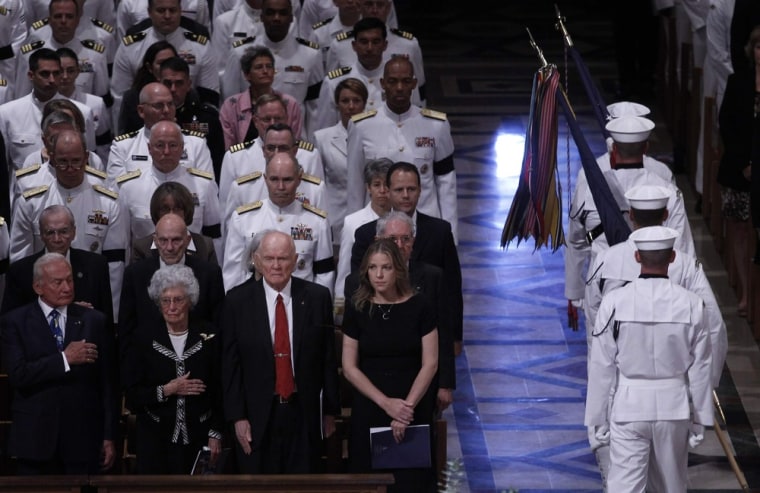The nation bid farewell to Neil Armstrong, the first man to take a giant leap on the moon, at a memorial service that also called for rekindling the spirit of exploration.
"Neil Armstrong left more than footprints and a flag on the moon," NASA Administrator Charles Bolden told an estimated 1,500 mourners who crowded into Washington National Cathedral on Thursday. "He left a foundation for the future and paved the way for future American explorers to be the first to step foot on Mars or another planet. Today, let us recommit ourselves to this grand challenge in honor of the man who first demonstrated it was possible to reach new worlds."
Bolden read a letter from President Barack Obama to Armstrong's family, saying that "the imprint he left on the surface of the moon is matched only by the extraordinary mark he left on ordinary Americans."
Armstrong set foot on the moon during the Apollo 11 mission in July 1969, marking the climax of the Cold War's space race. "That's one small step for (a) man, one giant leap for mankind," he declared. After a long career in the aerospace industry and academia, Armstrong died on Aug. 25 in Ohio at the age of 82, due to complications from heart surgery.
Thursday's ceremony in Washington followed up on a family service that was conducted on Aug. 31 in Cincinnati, near the Armstrong home in Indian Hill, Ohio. That earlier gathering was a private affair. The interfaith service at the cathedral, in contrast, was broadcast over NASA TV and streamed over the Internet by NASA, the cathedral and a myriad of media outlets.
'It was never about Neil'
Armstrong's fellow Apollo astronauts played prominent roles in Thursday's ceremony. One of his crewmates on the historic Apollo 11 flight in 1969, Michael Collins, led the congregation in prayer. The man who walked alongside Armstrong on the moon, Buzz Aldrin, held a place of honor in the audience — next to retired senator-astronaut John Glenn and his wife Annie.
Apollo 17 commander Gene Cernan, who was the last man to leave footprints on the moon in 1972, eulogized Armstrong as "a national hero of unimaginable proportion" as well as "a man who, when he became your friend, was a friend for a lifetime."
Cernan and the other speakers repeatedly referred to Armstrong's preference for privacy after the moon mission. Armstrong unfailingly sought to divert attention from his own achievements to the team of hundreds of thousands who supported the Apollo effort, Cernan said.
"In Neil's mind, it was never about Neil," Cernan explained. "It was about you, your mothers and fathers, your grandparents, those of an earlier generation, who gave him the opportunity to walk on the moon. ... He always gave credit to those who just didn't know it couldn't be done."
Cernan said no one could have accepted the burden that accompanied being the first human to set foot on another celestial body with more dignity than Armstrong did. Cernan ended his tribute by addressing his remarks directly to the departed.
"You have now shown once again the pathway to the stars," he said. "As you soar through the heavens beyond even where eagles dare to go, you can now finally put out your hand and touch the face of God."
Scripture and song
Former Treasury Secretary John Snow, who came to know Armstrong through his post-NASA work on corporate boards, said that "knowing Neil was to appreciate that he was the most reluctant of heroes."
"He's now slipped the bonds of Earth once again, but what a legacy he left," Snow told the gathering.
The Rt. Rev. Mariann Edgar Budde, bishop of the Episcopal diocese of Washington, said Armstrong exemplified the spirit of teamwork that was required for journeys beyond Earth. "No one goes alone to the moon," she said.
The service featured prayers and scriptural readings, including the beatitudes from the Gospel of Matthew ("Blessed are those who mourn, for they shall be comforted"); a recording of President John F. Kennedy's 1962 speech on America's space effort ("We choose to go to the moon in this decade and do the other things — not because they are easy, but because they are hard"); and music, including a rendition of "Fly Me to the Moon" from jazz singer-songwriter Diana Krall ("Fly me to the moon, and let me play among those stars").
This isn't the first time the cathedral has served as the venue for space-related ceremonies: The memorial service for the astronauts who died in the Columbia tragedy was held there in 2003 — and during a ceremony in 1974, Armstrong, Aldrin and Collins presented the cathedral with a moon rock from the Apollo 11 mission. That rock became the centerpiece for one of the church's stained-glass windows, now known as the Space Window.
Armstrong was a Navy combat pilot during the Korean War and requested a burial at sea. The interment is to take place on Friday, but no details about the circumstances of the at-sea ceremony have been announced. In honor of Armstrong's life and legacy, flags are to be flown at half-staff on Friday.
The Ohio-born astronaut is survived by his wife, Carol; two sons by his former wife, Janet; a stepson and stepdaughter, 10 grandchildren, a brother and a sister.
This report includes information from NBC News, The Associated Press and Reuters.
